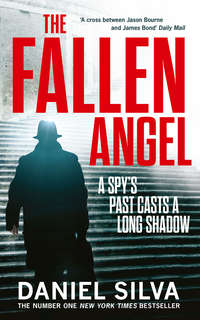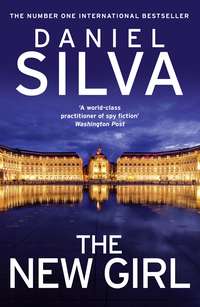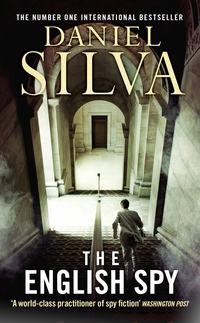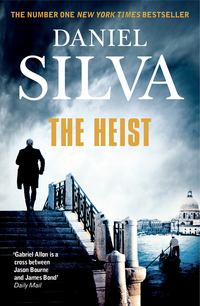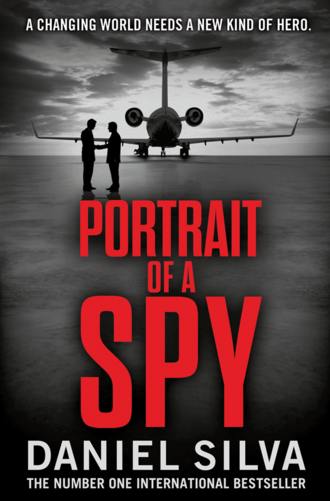
Полная версия
Portrait of a Spy
Purveyors of museum-quality Italian and Dutch Old Master paintings since 1968, the gallery had once occupied a lofty perch on tony New Bond Street in Mayfair. Driven into St. Jamesian exile by the likes of Hermès, Burberry, and Cartier, it had taken refuge in three floors of a sagging warehouse once owned by Fortnum & Mason. Among the incestuous, backbiting villagers of St. James’s, the gallery had always been regarded as rather good theater—comedy and tragedy, stunning highs and seemingly bottomless lows, and always a whiff of conspiracy lying just beneath the surface. This was, in large measure, a consequence of the owner’s personality. Julian Isherwood was cursed with a near fatal flaw for an art dealer—he liked to possess art more than he liked to sell it. As a result, he was burdened with a large inventory of what is affectionately known in the trade as dead stock—paintings for which no buyer would ever pay a fair price. It was rumored that Isherwood’s personal holdings rivaled those of the British royal family. Even Gabriel, who had restored paintings for the gallery for more than thirty years, had only the vaguest idea of Isherwood’s true holdings.
They found him in his office—a tall, slightly precarious figure tilted against the front of a desk piled with old catalogs and monographs. He wore a gray chalk-stripe suit and a lavender necktie that had been given to him the previous evening by his latest love interest. As usual, he appeared slightly hungover, a look he cultivated. His eyes were fixed mournfully on the television.
“I take it you’ve heard the news?”
Gabriel nodded slowly. He and Chiara had heard the first bulletins on the radio as they were passing through the western suburbs of London. The images playing out on the screen were remarkably similar to the ones that had formed in Gabriel’s own mind—the dead covered in plastic sheeting, the bloodied survivors, the onlookers with their palms pressed to their faces in horror. It never changed. He supposed it never would.
“I had lunch at Fouquet’s last week with a client,” Isherwood said, running a hand through his longish gray locks. “We parted company on the very spot where that maniac detonated his bomb. What if the client had scheduled the lunch for today? I might have been—”
Isherwood stopped himself. It was a typical reaction after an attack, thought Gabriel. The living always sought to find some connection, however tenuous, to the dead.
“The bomber in Copenhagen killed children,” Isherwood said. “Will you please explain to me what cause is served by the murder of innocent children?”
“Fear,” said Gabriel. “They want us to be afraid.”
“When is this going to end?” Isherwood asked, shaking his head in disgust. “When in God’s name is this madness going to end?”
“You should know better than to ask a question like that, Julian.” Gabriel lowered his voice and added, “After all, you’ve had a ringside seat at this war for a very long time.”
Isherwood gave a melancholy smile. His backbone-of-England surname and English scale concealed the fact that he was not, at least technically, English at all. British by nationality and passport, yes, but German by birth, French by upbringing, and Jewish by religion. Only a handful of trusted friends knew that Isherwood had staggered into London as a child refugee in 1942 after being carried across the snowbound Pyrenees by a pair of Basque shepherds. Or that his father, the renowned Paris art dealer Samuel Isakowitz, had been murdered at the Sobibor death camp along with Isherwood’s mother. Though Isherwood had carefully guarded the secrets of his past, the story of his dramatic escape from Nazi-occupied Europe had reached the ears of Israel’s secret intelligence service. And in the mid-1970s, during a wave of Palestinian terrorist attacks against Israeli targets in Europe, he was recruited as a sayan, a volunteer helper. Isherwood had but one assignment—to assist in building and maintaining the operational cover of an art restorer and assassin named Gabriel Allon.
“Just keep one thing in mind,” Isherwood said. “You work for me now, not them. This isn’t your problem, petal. Not anymore.” He aimed his remote at the television and the mayhem in Paris and Copenhagen vanished, at least for the moment. “Let’s have a look at something beautiful, shall we?”
The limited space of the gallery had compelled Isherwood to arrange his empire vertically—storerooms on the ground floor, business offices on the second, and on the third, a glorious formal exhibition room modeled on Paul Rosenberg’s famous gallery in Paris, where young Julian had spent many happy hours as a child. As they entered the room, midday sun was slanting through the overhead skylight, illuminating a large oil painting propped on a baize-covered pedestal. It was a depiction of the Madonna and Child with Mary Magdalene, set against an evening backdrop, quite obviously of the Venetian School. Chiara removed her car-length leather coat and sat on the museum-style ottoman at the center of the room. Gabriel stood directly before the canvas, one hand resting on his narrow chin, his head tilted to one side.
“Where did you find it?”
“In a great limestone pile along the Norfolk coast.”
“Does the pile have an owner?”
“Insists on anonymity. Suffice it to say he descends from a family of title, his property holdings are enormous, and his cash reserves are dwindling at an alarming rate.”
“So he asked you to take a few paintings off his hands to keep him afloat for another year.”
“At the rate he goes through money, I’d give him two months at the outside.”
“How much did you pay for it?”
“Twenty thousand.”
“How charitable of you, Julian.” Gabriel glanced at Isherwood and added, “I assume you covered your tracks by taking a few other pictures as well.”
“Six worthless pieces of crap,” Isherwood confessed. “But if my hunch about this one is correct, they were well worth the investment.”
“Provenance?” asked Gabriel.
“It was purchased in the Veneto by one of the owner’s ancestors while he was doing his Grand Tour in the early nineteenth century. It’s been in the family ever since.”
“Current attribution?”
“Workshop of Palma Vecchio.”
“Really?” asked Gabriel skeptically. “According to whom?”
“The Italian art expert who brokered the sale.”
“Was he blind?”
“Only in one eye.”
Gabriel smiled. Many of the Italians who had advised British nobility during their travels were charlatans who did a brisk trade in worthless copies falsely attributed to the masters of Florence and Venice. Occasionally, they erred in the opposite direction. Isherwood suspected that the painting on the pedestal fell into the second category. So, too, did Gabriel. He dragged the tip of his forefinger over the face of the Magdalene, dislodging a century’s worth of surface grime.
“Where was it hung? In a coal mine?”
He picked at the heavily discolored varnish. In all likelihood, it was composed of a mastic or dammar resin that had been dissolved with turpentine. Removing it would be a painstaking process involving the use of a carefully calibrated mixture of acetone, methyl proxitol, and mineral spirits. Gabriel could only imagine the horrors that awaited him once the old varnish had been stripped away: archipelagos of pentimento, a desert of surface cracks and creases, wholesale paint losses concealed by previous restorations. And then there was the condition of the canvas, which was sagging dramatically with age. The remedy was a relining, a perilous procedure involving the application of heat, moisture, and pressure. Any restorer who had ever performed a relining had the scars to prove it. Gabriel had once destroyed a large portion of a painting by Domenico Zampieri by using an iron with a faulty temperature gauge. The fully restored painting, while pristine to the untrained eye, was definitely a collaborative effort between Zampieri and the Studio of Gabriel Allon.
“Well?” asked Isherwood again. “Who painted the bloody thing?”
Gabriel made a show of deliberation. “I’ll need X-rays to make a definitive attribution.”
“My man is dropping by later this afternoon to take the pictures. But we both know that you don’t need them to make a preliminary attribution. You’re like me, petal. You’ve been around paintings for a hundred thousand years. You know it when you see it.”
Gabriel fished a small magnifying glass from his coat pocket and used it to examine the brushstrokes. Leaning slightly forward, he could feel the familiar shape of a Beretta 9mm pistol digging into the flesh of his left hip. Having worked with British intelligence to sabotage the Iranian nuclear program, he was now permitted to carry a weapon at all times for protection. He had also been granted a British passport, which he was free to use for foreign travel, provided he was not working for his old service. There was no chance of that. The illustrious career of Gabriel Allon was finally over. He was no longer Israel’s avenging angel. He was an art restorer employed by Isherwood Fine Arts, and England was his home.
“You have a hunch,” said Isherwood. “I can see it in those green eyes of yours.”
“I do,” replied Gabriel, still entranced by the brushstrokes, “but I’d like a second opinion first.”
He glanced over his shoulder at Chiara. She was toying with a strand of her unruly hair, a slightly bemused expression on her face. Posed as she was now, she bore a striking resemblance to the woman in the painting. It was hardly surprising, thought Gabriel. The descendant of Jews expelled from Spain in 1492, Chiara had been raised in the ancient ghetto of Venice. It was quite possible some of her ancestors had served as models for masters such as Bellini, Veronese, and Tintoretto.
“What do you think?” he asked.
Chiara joined Gabriel before the canvas and clucked her tongue in disapproval at its deplorable condition. Though she had studied the Roman Empire at university, she had assisted Gabriel on a number of restorations and, in the process, had become a formidable art historian in her own right.
“It’s an excellent example of a Holy Conversation, or Sacra Conversazione, an idyllic scene in which subjects are grouped against an aesthetically pleasing landscape. And as any oaf knows, Palma Vecchio is regarded as the originator of the form.”
“What do you think of the draftsmanship?” Isherwood asked, a lawyer leading a sympathetic witness.
“It’s awfully good for Palma,” Chiara replied. “His palette was unrivaled, but he was never regarded as a particularly skilled draftsman, even by his contemporaries.”
“And the woman who posed as the Madonna?”
“Unless I’m mistaken, which is highly unlikely, her name is Violante. She appears in a number of Palma’s paintings. But there was another famous painter in Venice at the time who was said to be quite fond of her. His name was—”
“Tiziano Vecellio,” Isherwood said, completing the thought for her. “Better known as Titian.”
“Congratulations, Julian,” Gabriel said, smiling. “You just snared a Titian for the paltry sum of twenty thousand pounds. Now you just need to find a restorer capable of knocking it into shape.”
“How much?” Isherwood asked.
Gabriel pulled a frown. “It’s going to take a great deal of work.”
“How much?” Isherwood repeated.
“Two hundred thousand.”
“I could find someone else for half that.”
“That’s true. But we both remember what happened the last time you tried that.”
“How soon can you start?”
“I’ll have to check my calendar before making any commitments.”
“I’ll give you an advance of one hundred thousand.”
“In that case, I can start right away.”
“I’ll send it to Cornwall the day after tomorrow,” Isherwood said. “The question is, when will I have it back?”
Gabriel made no response. He stared at his wristwatch for a moment, as though it were no longer keeping proper time, then tilted his face thoughtfully toward the skylight.
Isherwood placed a hand gently on his shoulder. “It’s not your problem, petal,” he said. “Not anymore.”
Chapter 4
Covent Garden, London
A POLICE CHECKPOINT NEAR LEICESTER SQUARE had brought the traffic on Charing Cross Road to a standstill. Gabriel and Chiara hurried through a fogbank of exhaust fumes and set out along Cranbourn Street. It was lined with pubs and coffee bars catering to the herds of tourists who seemed to wander aimlessly through Soho at all hours, regardless of the season. For now, Gabriel seemed oblivious to them. He was staring at the screen of his mobile phone. The death tolls in Paris and Copenhagen were rising.
“How bad?” asked Chiara.
“Twenty-eight on the Champs-Élysées and another thirty-seven at the Tivoli Gardens.”
“Do they have any idea who’s responsible?” asked Chiara.
“It’s still too early,” Gabriel said, “but the French think it might be al-Qaeda in the Islamic Maghreb.”
“Could they have pulled off a pair of coordinated attacks like this?”
“They have cells scattered across Europe and North America, but the analysts at King Saul Boulevard have always been skeptical of their ability to carry out a Bin Laden–style spectacular.”
King Saul Boulevard was the address of Israel’s foreign intelligence service. It had a long and deliberately misleading name that had very little to do with the true nature of its work. Those who worked there referred to it as the Office and nothing else. Even retired agents like Gabriel and Chiara never uttered the organization’s real name.
“It doesn’t feel like Bin Laden to me,” Chiara said. “It feels more like—”
“Baghdad,” said Gabriel. “These death tolls are high for open-air attacks. It suggests the bomb maker knew what he was doing. If we’re lucky, he left behind his signature.”
“We?” asked Chiara.
Gabriel wordlessly returned the phone to his coat pocket. They had reached the chaotic traffic circle at the end of Cranbourn Street. There were two Italian restaurants—the Spaghetti House and Bella Italia. He looked at Chiara and asked her to choose.
“I’m not going to start my long weekend in London at Bella Italia,” she said, frowning. “You promised to take me to a proper lunch.”
“In my opinion, one can do far worse in London than Bella Italia.”
“Unless one was born in Venice.”
Gabriel smiled. “We have a reservation at a lovely place called Orso in Wellington Street. It’s very Italian. I thought we could walk through Covent Garden on our way.”
“Do you still feel up to it?”
“We have to eat,” he said, “and the walk will do us both good.”
They hurried across the traffic circle into Garrick Street where two Metropolitan Police officers in lime green coats were questioning the Arab-looking driver of a white panel van. The anxiety of the pedestrians was almost palpable. In some of the faces Gabriel saw genuine fear; in others, a grim resolution to carry on as normal. Chiara held his hand tightly as they strolled past the shop windows. She had been looking forward to this weekend for a long time and was determined not to let the news from Paris and Copenhagen spoil it.
“You were a bit hard on Julian,” she said. “Two hundred thousand is twice your usual fee.”
“It’s a Titian, Chiara. Julian is going to do quite nicely.”
“The least you could’ve done is accept his invitation to a celebratory lunch.”
“I didn’t want to have lunch with Julian. I wanted to have lunch with you.”
“He has an idea he wants to discuss.”
“What sort of idea?”
“A partnership,” Chiara said. “He wants us to become partners in the gallery.”
Gabriel slowed to a stop. “Let me make this as clear as possible,” he said. “I have absolutely no interest in becoming a partner in the sometimes-solvent firm of Isherwood Fine Arts.”
“Why not?”
“For one thing,” he said, walking again, “we have no idea how to run a business.”
“You’ve run several very thriving enterprises in the past.”
“It’s easy when you have the backing of an intelligence service.”
“You’re not giving yourself enough credit, Gabriel. How hard can it be to run an art gallery?”
“Incredibly hard. And as Julian has proven time and time again, it’s easy to get into trouble. Even the most successful gallery can go under if it places a bad bet.” Gabriel gave her a sidelong look and asked, “When did you and Julian concoct this little arrangement?”
“You make it sound as if we were conspiring behind your back.”
“That’s because you were.”
With a smile, Chiara conceded the point. “It happened when we were in Washington for the unveiling of the Rembrandt. Julian pulled me aside and said he was beginning to think about the possibility he might actually retire. He wants the gallery to end up in the hands of someone he trusts.”
“Julian will never retire.”
“I wouldn’t be so sure about that.”
“Where was I when this deal was being hatched?”
“I believe you’d slipped outside for a private conversation with a British investigative reporter.”
“Why didn’t you tell me about any of this until now?”
“Because Julian asked me not to.”
With his edgy silence, Gabriel made it clear that Chiara had violated one of the fundamental tenets of their marriage. Secrets, even undeniably trivial ones, were forbidden.
“I’m sorry, Gabriel. I should have said something, but Julian was adamant. He knew your first instinct would be to say no.”
“He could sell the gallery to Oliver Dimbleby in a heartbeat and retire to an island in the Caribbean.”
“Have you considered what that might mean for us? Do you really want to clean pictures for Oliver Dimbleby? Or Giles Pittaway? Or were you thinking you could scrape up a bit of freelance work from the Tate or the National Gallery?”
“It sounds as if you and Julian have it all worked out.”
“We do.”
“Then perhaps you should become Julian’s partner.”
“Only if you clean pictures for me.”
Gabriel could see that Chiara was serious. “Running a gallery isn’t all about attending glamorous auctions and having long lunches in fancy restaurants in Jermyn Street. And it’s not something that should be considered a hobby.”
“Thank you for dismissing me as a dilettante.”
“That’s not what I meant, and you know it.”
“You’re not the only one who’s retired from the Office, Gabriel. I am, too. But unlike you, I don’t have damaged Old Masters to occupy my time.”
“So you want to become an art dealer? You’ll spend your days rummaging through piles of mediocre paintings, looking for another lost Titian. And chances are you’ll never find one.”
“It doesn’t sound that bad to me.” Chiara looked around the street. “And it means we could live here.”
“I thought you liked Cornwall.”
“I adore it,” she said. “Just not in winter.”
Gabriel lapsed into silence. He had been bracing himself for a conversation like this for some time. “I thought we were going to have a baby,” he said.
“So did I,” Chiara said. “But I’m beginning to think it might not be possible. Nothing I try seems to be working.”
There was a note of resignation in her voice that Gabriel had never heard before. “So we’ll keep trying,” he said.
“I just don’t want you to be disappointed. It was the miscarriage. It’s going to make it much harder for me to ever conceive again. Who knows? A change of scenery might help. Just think about it,” she said, squeezing his hand. “That’s all I’m saying, darling. We might actually enjoy living here.”
In the broad Italianate piazza of the Covent Garden Market, a street comedian was arranging a pair of unsuspecting German tourists into a pose suggestive of sexual intimacy. Chiara leaned against a pillar to watch the performance while Gabriel fell into an undignified sulk, his eyes scanning the large crowd gathered in the square and atop the balcony bar of the Punch and Judy. He was not angry with Chiara but with himself. For years, their relationship had revolved around Gabriel and his work. It had never occurred to him that Chiara might have career aspirations of her own. If they were a normal couple, he might have considered the opportunity. But they were not a normal couple. They were former operatives of one of the world’s most celebrated intelligence services. And they had a past that was far too bloody to lead so public a life.
As they headed into the soaring glass arcade of the market, any residual tension from their quarrel quickly dissipated. Even Gabriel, who detested shopping in all its forms, took pleasure in roaming the colorful shops and stalls with Chiara at his side. Intoxicated by the smell of her hair, he imagined the afternoon that lay ahead—a quiet lunch followed by a pleasant walk back to their hotel. There, in the cool shadows of their room, Gabriel would slowly undress Chiara and make love to her in the enormous bed. For a moment, it was almost possible for Gabriel to imagine his past had been erased, that his exploits were mere fables gathering dust in the file rooms of King Saul Boulevard. Only the watchfulness remained—the instinctive, gnawing vigilance that made it impossible for him to ever feel completely at peace in public. It forced him to make a mental charcoal sketch of every passing face in the crowded market. And in Wellington Street, as they were approaching the restaurant, it caused him to freeze in his tracks. Chiara tugged playfully at his arm. Then she stared directly into his eyes and realized something was wrong.
“You look as though you just saw a ghost.”
“Not a ghost. A dead man.”
“Where?”
Gabriel nodded toward a figure in a gray woolen overcoat.
“Right there.”
Chapter 5
Covent Garden, London
THERE ARE TELLTALE INDICATORS COMMON to suicide bombers. Lips can move involuntarily as final prayers are recited. Eyes can have a glassy thousand-yard stare. And the face can sometimes appear unnaturally pale, evidence that an unkempt beard has been hastily removed in preparation for a mission. The dead man exhibited none of these traits. His lips were pursed. His eyes were clear and focused. And his face was evenly colored. He had been shaving regularly for a long time.
What set him apart was the thin tributary of sweat leaking from his left sideburn. Why was he perspiring on a crisp autumn afternoon? If he was warm, why were his hands buried in the pockets of his woolen overcoat? And why was the overcoat—a size too large, in Gabriel’s opinion—still tightly buttoned? And then there was his walk. Even a physically fit man in his late twenties will have difficulty feigning a normal gait when saddled with fifty pounds of high explosives, nails, and ball bearings. As the dead man walked past Gabriel in Wellington Street, he appeared unusually erect, as if he were trying to compensate for the added weight around his abdomen and kidneys. The fabric of his gabardine trousers vibrated with each step, as though the joints in his hips and knees were shuddering beneath the burden of the bomb. It was possible that the perspiring young man with the oversized coat was an innocent who simply needed to do a bit of midday shopping, but Gabriel suspected otherwise. He believed the man walking a few paces ahead represented the finale of a continent-wide day of terror. First Paris, then Copenhagen, and now London.
Gabriel ordered Chiara to take shelter in the restaurant and quickly crossed to the opposite pavement. He shadowed the dead man for approximately a hundred yards, then watched as he rounded the corner into the entrance of the Covent Garden Market. There were two cafés on the eastern side of the piazza, each filled with lunchtime patrons. Standing between them in a patch of sunlight were three uniformed Metropolitan Police Service officers. None took notice of the dead man as he entered the market arcade.
Gabriel now had a decision to make. The most obvious course of action was to tell the police of his suspicions—obvious, he thought, but not necessarily optimal. In all likelihood, the police would respond to Gabriel’s approach by pulling him aside for questioning, wasting several precious seconds. Worse still, they might confront the man, a ploy that would almost certainly cause him to detonate his weapon. Although virtually every officer on the Met had been given basic instruction in counterterrorism tactics, few had the experience or firepower necessary to take down a committed jihadist bent on martyrdom. Gabriel had both, and he had acted against suicide bombers before. He glided past the three officers and slipped inside the arcade.




